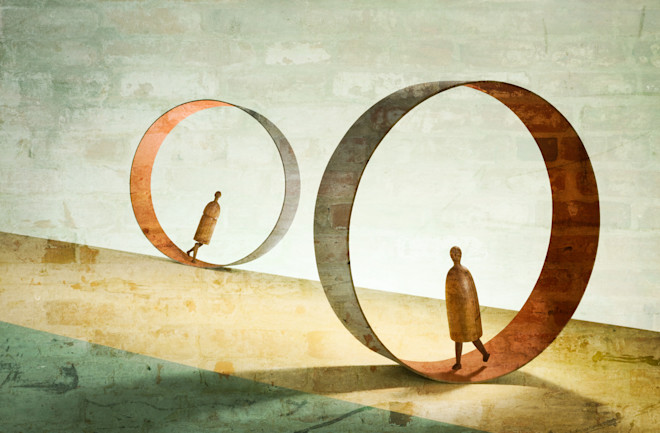The standard public health threats are all-too familiar: Smoking. High blood pressure. Cancer. More recently, COVID-19. But a new government advisory made headlines in 2023 by adding an unexpected major player to that list. Loneliness, stated the report from Surgeon General Vivek Murthy, is a widely underrecognized U.S. health crisis.
In recent years, about 50 percent of Americans have experienced loneliness, which comes with a hefty dose of adverse effects. Lonely people, as Murthy’s report warns, run the same mortality risk as people who smoke 15 cigarettes a day.
“Millions of people in America are struggling in the shadows, and that’s not right,” Murthy told the Associated Press in May. “I issued this advisory to pull back the curtain on a struggle that too many people are experiencing.”
Institutions that once fostered social connection, such as churches and community-based organizations like Rotary Clubs, are shrinking or disappearing. That civic disintegration, along with a COVID-driven remote work boom, is nudging more people into the lonely category.
Still, on its face, Murthy’s warning sounds awfully dire — and somewhat baffling. It’s hard to fathom how a lack of companionship could be as threatening as an addiction or global pandemic.
But humans are so biologically wired to be social that isolation wreaks surprising havoc on our systems. People who lack social support have a 29 percent higher risk of heart disease, a 32 percent higher risk of stroke, and a 26 to 29 percent higher risk of premature death, according to the report. What’s more, such health effects in isolated older adults have led to about $6.7 billion in excess Medicare spending each year.
Does Loneliness Cause Health Problems?
Scientists now know that loneliness can cause a broad swath of health problems. That may be because ancestral humans thrived in supportive communities — and anything less can set off a biochemical stress response. “Our brains function more efficiently when we are with others,” says Julianne Holt-Lunstad, a professor of psychology and neuroscience at Brigham Young University and the lead scientist on the surgeon general’s advisory.
In multiple studies, the stress of aloneness has been linked to higher levels of inflammation in the body. When this inflammation persists, the resulting cellular damage can lead to chronic illnesses like vascular disease, diabetes, and Alzheimer’s.
The ill effects of excess alone time show up in more immediate ways, too. When University of Vienna psychologist Giorgia Silani and her team deprived 30 people of social contact and monitored them for eight hours, their energy levels plummeted as if they’d starved themselves for the whole day. The results were published in Psychological Science in May.
“If you don’t eat, you feel weaker, you don’t have the resources for moving and doing things,” Silani says. “We found the same effect [with] social isolation.” Since humans rely on personal connections to make life easier, she thinks social deprivation may cause us to overestimate the effort it takes to tackle life alone, making us feel depleted.
What Can People Do?
Since loneliness can feel so much like a personal failure, it’s easy to assume people should just try to handle it on their own. But in reality, many of the factors that promote social isolation are structural ones. “It could be workplace policies that don’t allow flexibility to nurture personal relationships,” Holt-Lunstad says. “It might be busy or unsafe streets that are barriers to getting to know your neighbors.”
As a result, the solutions Murthy and Holt-Lunstad propose aren’t all individual lifestyle changes. “We recommend investing in social infrastructure to help build connections in communities,” Holt-Lunstad says. That could mean increasing support for civic hubs like volunteer programs, redesigning public spaces to encourage gatherings, or revamping digital spaces in ways that promote bonding.
Some future doctors might prescribe neighborhood mixers or bingo nights to ward off chronic illness. But in an ideal world, social contact would be so effortless that they’d never have to.
This story was originally published in our January February 2024 issue. Click here to subscribe to read more stories like this one.

